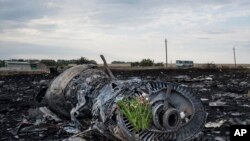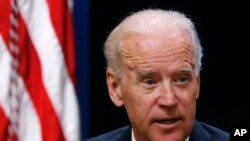The missile attack against a civilian airliner high above eastern Ukraine, killing all 298 aboard, is already seen as a pivotal moment in the Ukraine crisis. China has said the conflict is an internal struggle that should be negotiated peacefully, but has resisted joining Western-led sanctions against Moscow.
After the MH17 crash, China joined the international community expressing condolences for the victims and their families.
In a statement issued shortly after the tragedy, the country's Foreign Ministry said it was shocked by the crash and hoped the causes would be found as soon as possible.
But while some countries, including Australia and the United States, have "pointed the finger" at Russia - which they say is arming the rebels in Donetsk and is likely to have provided technical assistance with the missile that downed the plane - China has refrained from making any accusation.
Zhu Feng, a professor of international relations at Peking University, says China will not rush to a conclusion too early, and the severity of the incident calls for an independent international investigation.
“If Russia will be found responsible for this, then Russia will have to shoulder that responsibility. But we cannot just pick a conclusion and say that Russia is behind this as a certainty,” he said.
Passenger Plane Shootings
Rockets have shot down passenger planes before. Here are a few examples:
October 4, 2001
Ukraine's military is conducting an exercise shooting missiles at drones when one missile locks onto a Siberia Airlines plane en route from Novosibirsk to Tel Aviv. All 78 people on board are killed.
July 3, 1988
U.S. warship Vincennes mistakes Iranian passenger plane for a threatening warplane during the war between Iraq and Iran. All 290 people on board are killed when the airliner is shot down over the Gulf.
September 1, 1983
A Soviet fighter jet shoots down a Korean Air Lines passenger jet over Soviet airspace after mistaking it for a spy plane. All 269 people on board are killed, including U.S. Representative Lawrence McDonald of Georgia.
April 20, 1978
A Soviet fighter plane attacks an off-course South Korean jetliner. Two passengers die after the plane is forced to crash land.
February 21, 1973
Israeli jets fire at a Libyan Airlines flight traveling from Tripoli to Cairo that drifted into Israeli airspace. Israel claims the plane refused to identify itself. The airliner loses control and crashes, killing 108 people. Five survive the crash.
State media conveyed a similar message in an editorial Friday.
Xinhua said, “As there is still no convincing evidence on who is responsible for bringing down the unlucky Malaysian airliner MH17 over eastern Ukraine, any precipitate leap to a conclusion on the crash will only be detrimental to efforts for impartial investigation and calm the situation.”
The editorial quoted Russian President Vladimir Putin's position that Ukraine bears the responsibility as the tragedy occurred over its territory.
David Zweig, professor of politics at Hong Kong's University of Science and Technology, says China's restraint reflects Beijing's ambivalence about the conflict in Ukraine.
“It matches pretty much their view about the separatists in eastern Ukraine, which is that they don't like them but they don't want to hurt the relationship with Putin,” he said.
Russia's annexation of Crimea, as well as mounting evidence that Putin is sponsoring rebel forces in eastern Ukraine did not sit well in China.
Beijing has long championed the principle of non-interference in other countries' affairs and at home; it blames separatism for heightened tensions in ethnically diverse areas such as Tibet and Xinjiang.
“If the separatists [in Ukraine] get a bad reputation, that doesn't hurt China, only as it gets closer to Russia maybe they'd gonna be more concerned,” said David Zweig.
In response to the crash, the United States announced it will extend the scope of sanctions against Russia.
While analysts in China say the tragedy might spur more attention to the conflict in Ukraine, the Chinese government is not likely to endorse sanctions or publicly shame Russia.





